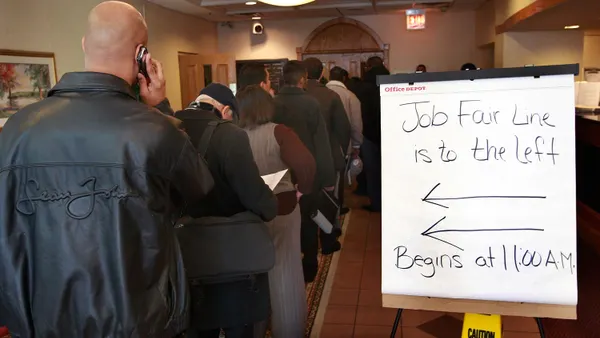Dive Brief:
- HR jobs are among the top 25 fastest growing positions in the U.S., according to a Jan. 18 LinkedIn report. Human resources analytics manager holds the No. 2 spot, just behind head of revenue operations, the data shows. Those roles — also called people analytics managers or talent analytics managers — offer salaries ranging from $41,600 to $122,000. New York City, San Francisco, Washington, D.C. and Baltimore are the top hiring locations, although nearly a quarter of the roles include remote availability, the research found.
- Diversity and inclusion manager was close behind as the third fastest growing job, with a few other HR roles also appearing on the list: Employee experience manager ranked No. 5, chief people officer ranked No. 15 and and head of rewards placed No. 21.
- Workers have been in the driver’s seat as a result of the pandemic, a LinkedIn spokesperson told HR Dive. With benefits like flexibility rising as a non-negotiable in the workplace, HR roles have become indispensable, she said. “And as companies have increased their focus on racial and social inequities at work, while at the same time re-prioritizing employee retention, we’ve seen a rise in diversity and inclusion roles,” the spokesperson noted.
Dive Insight:
Despite highly publicized layoffs in the tech and other industries and signs of a slowing economy, according to LinkedIn’s January 2023 Workforce Report, HR jobs seem to be on the rise. Several reasons stand out.
“It’s still a historically strong labor market, with nearly one job opening in the U.S. for every active applicant on LinkedIn,” the spokesperson said. “Our January workforce report showed that the year closed out with some slight hiring gains.” Based on LinkedIn’s data, “which takes a longer view in looking at growth over the last few years, we’re seeing that companies are still on the hunt to fill roles that prioritize their employees,” the spokesperson said.
Additionally, HR’s prominence increased tremendously during the height of the pandemic in 2020 and 2021. Almost every issue an organization faced had something to do with HR, an industry veteran previously told HR Dive. As a result, the skills and capabilities HR professionals needed to do their jobs expanded dramatically; HR pros now handle everything from product management and design thinking to analytics and data science, sources said. And the C-suite has taken notice, they noted. For example, HR pros have expertise in analyzing talent, which makes them an important strategic consultant to business leaders facing layoffs, employee shortages or retention issues, a CHRO recently told HR Dive.
Another reason for the demand: LinkedIn’s January workforce report showed new hiring gains across multiple industries, including farming, ranching and forestry, retail and accommodation. Industries “that are seeing an increase in hiring need HR professionals to help support employee engagement and mentoring initiatives, people management, and [for] implementing policies related to fostering diversity, equity and inclusion,” the spokesperson said.
Although hiring for DEI jobs may be on the rise, the positions are also the first to go when cutting costs, recruiters told Monster, according to its January future of work report. But recruiters also told Monster that workers are more interested than ever in DEI, and Workhuman’s 2023 Human Workplace Index noted that prioritizing inclusion and belonging can set employers apart in the recruitment process.
For many employers, retaining employees is a priority amid the growing economic uncertainty, and companies have been preparing for this by investing in DEI, LinkedIn’s spokesperson pointed out. “As companies invest in their culture, employees tend to be happier and feel more supported. As a result, they stay much longer, which is a huge cost saving, considering that hiring an employee costs several times more in time and money,” she said.













